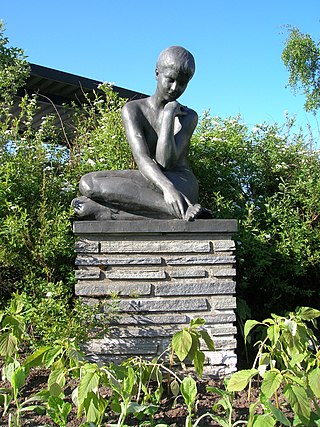Related Research Articles
Natalia is a female given name with the original Late Latin meaning of "Christmas Day". It is currently used in this form in Italian, Romanian, Spanish, Portuguese, Greek, Russian, Ukrainian, Bulgarian and Polish. Other forms and spellings include Natalie/Nathalie, Natálie (Czech), Natália/Nathália, Natalya/Nataliya, Nataliya/Natalya, Natallia, Natālija (Latvian), Natalija, Natàlia (Catalan) and ნატალია (Georgian).
Melinda is a feminine given name.
Nicola or Nichola is a Latinised version of the Greek personal name Nikolaos (Νικόλαος), derived from the nikē meaning "victory", and laos meaning "people", therefore implying the meaning "victory of the people". Nicola is both a male and female name, depending on cultural norms.
Michaela is a female given name. It is a female form of the Hebrew name Michael (מִיכָאֵל), which means "Who is like God".
Angelica is a female given name and a variant of Angelika.
Eve is an English given name for a female, derived from the Latin name Eva, in turn originating with the Hebrew חַוָּה. The traditional meaning of Eve is life or "living". It can also mean full of life and mother of life.
Tamara is a female given name most commonly derived from the Biblical name "Tamar" and in the Arabic from the singular form "Tamra" and the plural form "Tamar", meaning in both Hebrew and Arabic the generic name of the fruit "date", "date palm" or "palm tree".
Bella is a feminine given name. It is a diminutive form of names ending in -bella. Bella is related to the Italian, Spanish, Greek, Portuguese and Latin words for beautiful, and to the name Belle, meaning beautiful in French. It increased in usage following the publication of the Twilight books by Stephenie Meyer. It is also known for being a nickname to Isabella, Annabella or Arabella.
Jacqueline is a female given name.

Barbara is a given name used in numerous languages. It is the feminine form of the Greek word barbaros meaning "stranger" or "foreign".
Monica is a female given name with many variant forms, including Mónica, Mônica, Monique (French), Monika, Moonika (Estonia), and Mónika (Hungarian).
Mia is a feminine given name, originating as a hypocoristic of various unrelated names.

Rana is an Indian Surname of Sanskrit origin meaning "king" in South Asian languages and is the masculine derivative of the Sanskrit word "rānī" meaning "queen". It was commonly used as a princely title by the Nepalese Rana dynasty and by Rajput kings that ruled under a Maharana in the Indian subcontinent. It is today more commonly used as a surname among Rajputs in Rajasthan, Uttarakhand, Gujarat, Haryana, Maharashtra, Himachal Pradesh, Jammu, Punjab and Madhya Pradesh. Some other variants of the name include Rani and Ranee as well as the surname Rane, which is more common in Goa and Maharashtra.
Anika is a female given name of Sanskrit, German, Arabic, Swedish, Dutch, Hebrew, Māori, and African origin and is also an alternative spelling of the name Annika or Anikha
Carolina is a feminine given name in Spanish, English, Italian, Portuguese, Catalan and Swedish, derived from the masculine name Carolus which is Latin for Charles, generally meaning 'free man' or 'freeholder'.
Mara can be either a surname or a first name. Mara is Irish for ocean.
Stefania [in all languages except for Polish pronounced like Ste-pha-knee-ah] is a female name in Belarusian, Bulgarian, Croatian, Czech, Greek, Stefánia Hungarian, Italian, Romanian, Polish, Serbian, Macedonian, Slovak, Slovene, Ukrainian and Russian, originating from Old Greek meaning crowned or the winning.
Yara is a given name developed independently in the Arabic and Tupi languages, and also the anglicized spelling of a number of unrelated given names.

Roland is a masculine Frankish given name that is also used as a family name. Forms in other languages include: Orlando (Italian), Rolando, Roldán (Spanish).
Runa is a feminine given name with multiple origins from different, unrelated cultures.
References
- ↑ "Lilla name meaning". SheKnows.com . SheKnows Media. Retrieved 24 November 2014.
- ↑ "Lilla: Meaning, Popularity, Origin of Baby Name Lilla". Baby Name Wizard. CMI Marketing. Retrieved 24 November 2014.